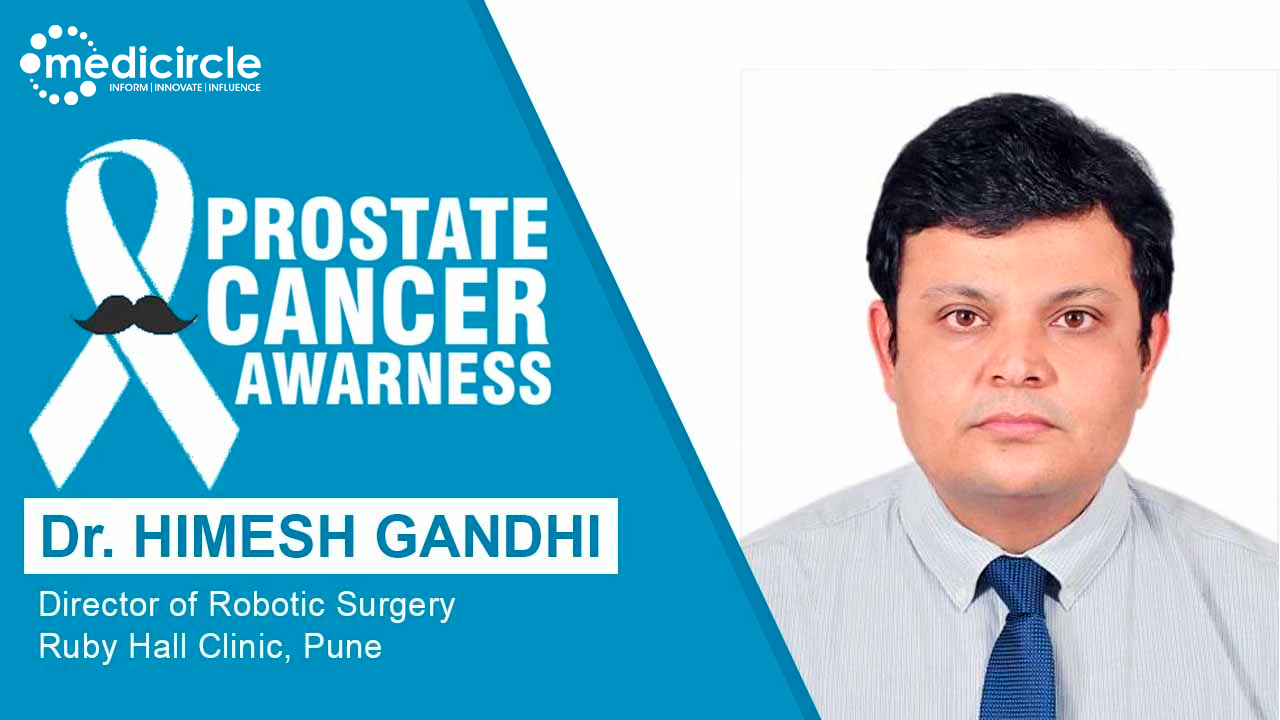Prostate cancer is a form of cancer that originates in the gland cells of the prostate. Prostate cancer is a common occurrence in men. The definite cause of this cancer is not known yet. But various studies have confirmed that family history, old age, and obesity can lead to this cancer. Symptoms include blood during urination, painful urination, blood in the semen, burning sensation while urinating, frequent urination, interrupted urine flow, and enlarged prostate. You need to be aware of this problem of prostate cancer which will help you deal with it. We at Medicircle are conducting interviews with eminent Doctors and Specialists to impart basic knowledge of prostate cancer and different treatments available for the same.
Dr. Himesh Gandhi is a Director of Robotic Surgery at Ruby Hall Clinic, Pune. He is practicing as a Consultant Uro-oncologist, Robotic Uro-oncosurgeon and Kidney transplant surgeon. His field of specialty is Uro-oncology and has performed more than 200 robotic surgeries related to prostate cancer, kidney cancer, bladder cancers and also many complex reconstructive surgeries after starting the department of Robotic surgery in Ruby Hall Clinic, Pune in 2017.
He has received Best Paper Award in 2015 for his research work on Kidney cancer in American Urological Association (AUA), New Orleans, 2015. He was also was selected by the Urological Society of India (USI) to attend Urology Resident Course, Singapore in 2014 to represent India. He is an active member of the Robotic Surgeons Council of India (RSCI)., American Urological Association and Singapore Urological Association.
Prostate cancer is curable till stage III
Dr. Himesh says, "Cancer has different stages and so does prostate cancer. Prostate cancer is curable till stage III. In stage IV (when cancer spreads to other parts), we can only control it with certain medications.
Treatment of stages I, II, III
(cancer is not beyond the boundaries of the prostate) – Robotic surgery or radiation.
Advantages of robotic surgery – Physically advanced technology, minimum trauma, reduced blood loss, less pain, shorter recovery time, cures cancer for lifetime, follow up is also simple
Advantages of radiation – No surgery, simple technology
Disadvantages of radiation – Frequent visit, regular follow-up is mandatory.
Prostate cancer is hereditary
Dr. Himesh explains, “Prostate cancer is hereditary. If there is a family history of cancer, then the risk of developing cancer in first-degree relatives increases by 2.5-8%. Generally, we ask the family history of all patients. If there is a positive history along with an elevated PSA level, the patient is considered to be in the high-risk category. Patients with no family history present at the age of 60-65 whereas patients of the high-risk category present at the age of 40-45 years. High-risk patients should be diagnosed early in their 4th or 5th decade for complete cure and longevity."
Prostate cancer and breast cancer
Dr. Himesh expresses, “The percentage of women suffering from breast cancer, uterine cancer and cervical cancer is very high in our country. All male generations associated with women with any of these cancers are at high risk (8%) of developing prostate cancer."
The responsible gene for prostate and breast cancer is – the BRCA gene. Patients with a family history of breast cancer, tend to have an aggressive type of prostate cancer. The BRCA gene cancer is intraductal carcinoma, where cancer fastly reaches stage IV. The family history of breast cancer is very important. The patients should consult a doctor if they have
Prostate related symptoms, Elevated PSA level, Family history of breast cancer.
Prostate cancer and colon cancer
Dr. Himesh mentions, “Prostate cancer and colon cancer are related to each other. The gene responsible for causing colon cancer also causes prostate cancer. Patients with a family history of colonic cancer and Lynch syndrome are also at higher risk of developing prostate cancer. They usually present at the age of 45-50 years. Patients with Lynch syndrome and prostate cancer should get their colonoscopy done and if the results come positive, then both should be treated simultaneously. "
Prostate cancer – Key statistics
Dr. Himesh concludes, "Prostate cancer is the third most common cause of mortality. Incidents are increasing rapidly. Every year 25,000-30,000 new patients are getting diagnosed with prostate cancer. The majority of cancers are in stage III and 15-20% of patients are in stage IV. Currently 5-7 lacs people are suffering from prostate cancer. Early detection is very important for the complete cure of disease."
(Edited by Renu Gupta)

 Dr. Himesh Gandhi talks about the key statistics of prostate cancer. He also emphasizes the importance of early diagnosis for high-risk categorized patients. Dr. Gandhi sheds light on breast cancer and colon cancer too.
Dr. Himesh Gandhi talks about the key statistics of prostate cancer. He also emphasizes the importance of early diagnosis for high-risk categorized patients. Dr. Gandhi sheds light on breast cancer and colon cancer too.


































